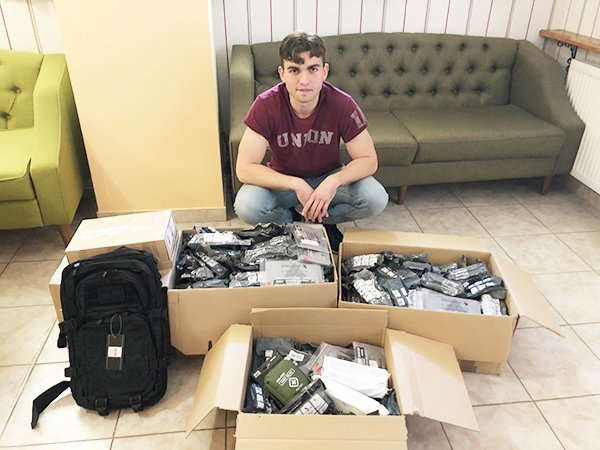Anton Tatus ’24 has a lot going on.
He graduated in June with a degree in economics. He started a brand-new job as an investment banking analyst in July. And he made a big move from Schenectady to New York City.
But there’s one thing he’s always going to have time for and that’s supporting Ukraine.
Why?
For one thing, Tatus grew up in Ukraine’s capital, Kyiv, only leaving to become a Union student in 2020 -- before Russia invaded Ukraine in 2022.
For another, “I think I had no choice. My efforts have always been focused on the Ukrainian people, who were placed into abysmal conditions by the war,” he said. “I feel that it is only fair for me to try to help and leverage my fortunate position here in the U.S.”
Right now, Tatus is most involved as a volunteer finance intern with Razom, the largest Ukrainian non-governmental organization in the U.S.
“My main responsibilities are assisting the CFO with budgeting, financial planning, modeling and any other tasks that arise -- preparation for audits, review of the investment statements and so on,” he said. “Additionally, I sometimes get involved with their advocacy work. I went to Washington, D.C. in April to attend the Ukraine Action Summit, which revolved around meetings with congresspeople and senators to advocate for Ukraine ahead of the vote on the Ukraine Aid Bill.”
Tatus’s advocacy has roots on campus.
As a student, he gave many informational talks at Union and in the surrounding community on the war, and he organized fundraising efforts to get humanitarian supplies to his home country.
“There are so many individuals at Union who stepped up right away and selflessly contributed their time, effort and resources,” Tatus said.
Professor Kristin Bidoshi was among them. She helped him launch a program that allows Union students to teach English to Ukrainian children via Zoom. This program continues today.
Bidoshi also helped organize an Amazon list of equipment and medicine needed by Ukrainians. Faculty could purchase items from the list that were then sent abroad.
“I led a similar effort among students,” Tatus said. “We managed to procure almost $5,000 worth of supplies that were delivered to Ukraine.”
Tatus himself also delivered goods during a term abroad in Berlin. He rented a van and drove to the Ukrainian border, but he couldn’t enter the country – not even to visit his parents and younger sister, who still live there.
“It was quite surreal being so close, to be honest. I do not think I have a good enough command of the written word to express how I felt,” he said. “But I will not be able to leave Ukraine if I go back, as all males aged 18 to 60 are not allowed to go abroad.”
In June, Tatus received Union’s Josephine Daggett Prize, in part for his work on behalf of Ukraine. He will continue to do all he can from the U.S. for his homeland.
“Kyiv is an incredibly beautiful city with a very long and complicated history, distinct and eclectic architecture, and hundreds of museums and exhibitions,” he said. “The fall of the Soviet Union in 1991 gave people of Ukraine the freedom that they sought for so long and they immediately started expressing themselves in art, literature, architecture and cuisine.”
“I do think that Kyiv is, or at least was before the war, in the avant-garde of the new Eastern European culture that exploded in the post-soviet era. Its diverse population and rich historical and cultural background proved to be fertile soil for new cultural explorations,” Tatus continued. “Ukraine is a huge country, and you can find any landscape or activity imaginable there, so there is always something new to see or experience.”
